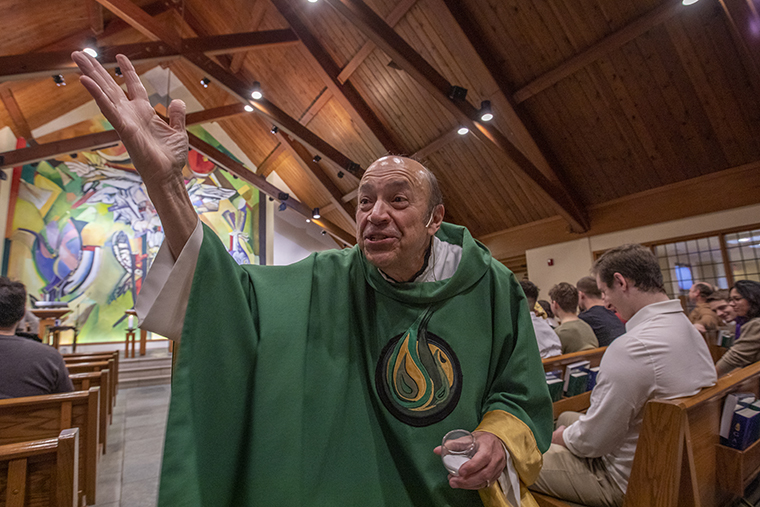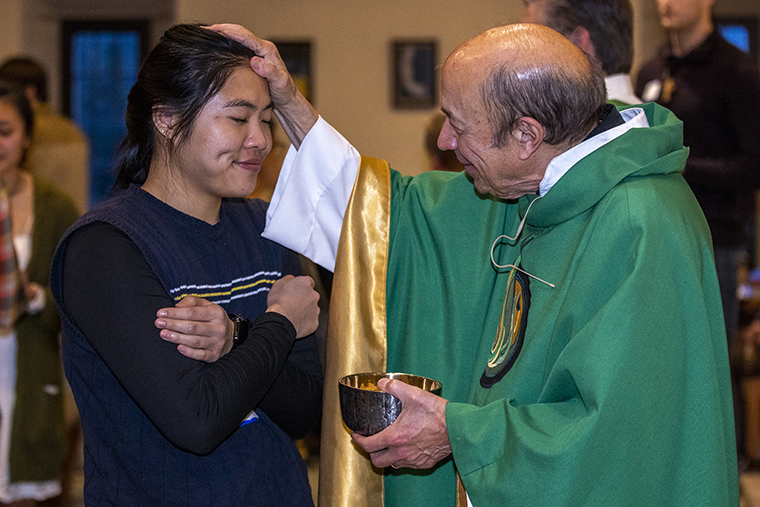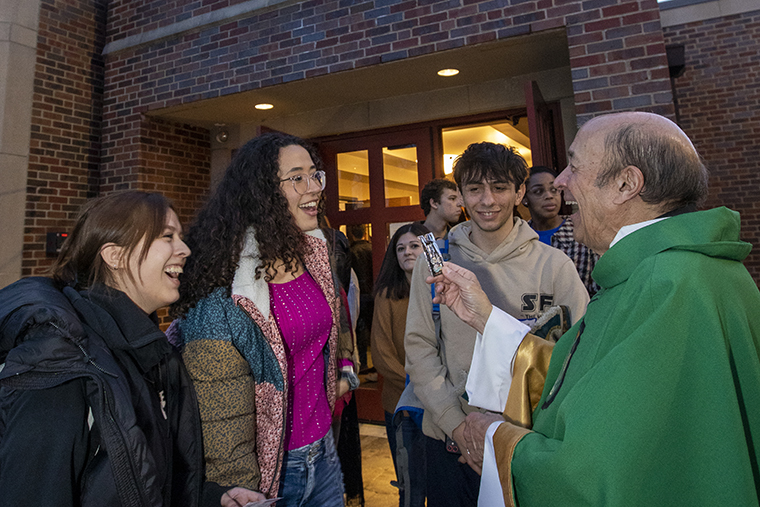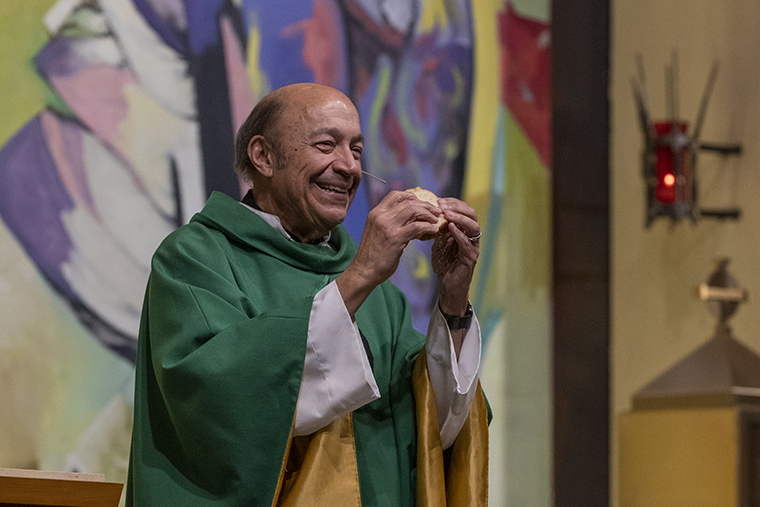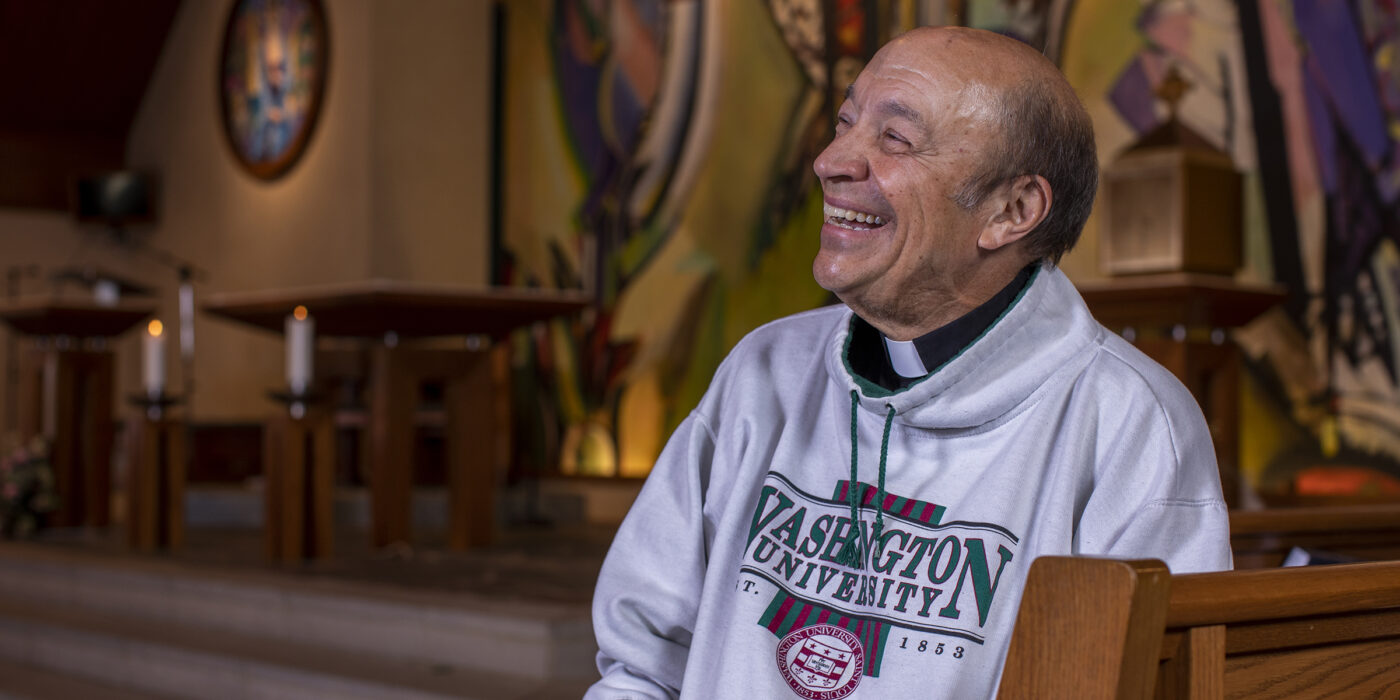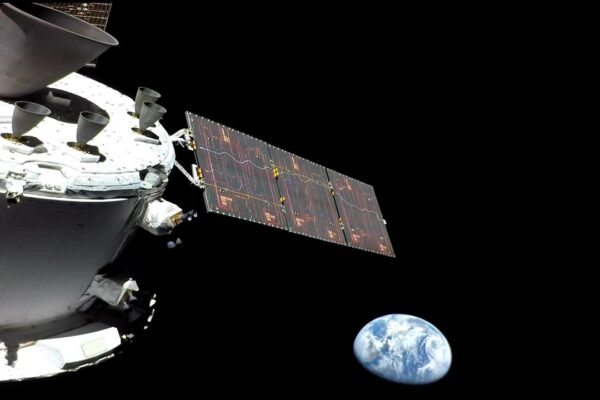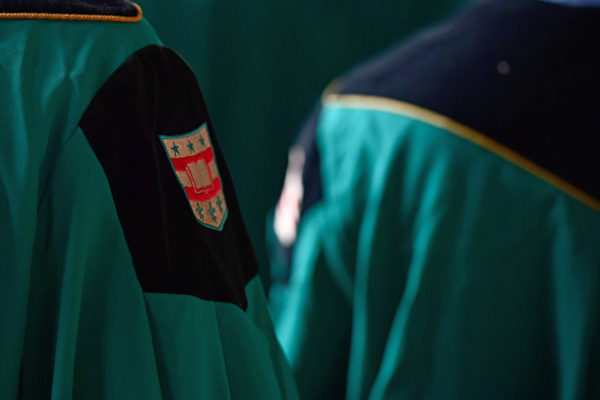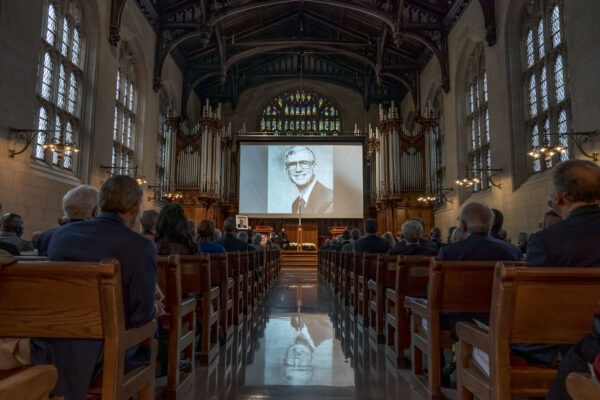The day after Christmas, Fr. Gary G. Braun, the affable, inimitable and longtime spiritual leader of the Catholic Student Center (CSC) at Washington University in St. Louis, was walking toward his front door facing Forsyth Avenue, when he slipped and fell on the icy pavement — specifically, the yellow paint atop one of the speedbumps on the circle drive.
Braun broke two ribs in the fall. He canceled a trip to Antarctica — the “trip of a lifetime” — and was laid up for most of January, as the injury left him in intense pain and a mental fog. “It was all so interesting to me,” he says. “My mind is always churning, and I’m always looking for new things to see or new ways of understanding. But the pain was so proximate, so immediate — I couldn’t be weaving any new ideas. I was very much in the ‘here and now.’”
Being sidelined was new ground for Braun (pronounced “Brown”), who is in his 33rd year as chaplain at the CSC. Suddenly, a man known for hugging couldn’t hug now. “Everything I’ve ever preached was tested,” he says. The unexpected pause provided time to reflect on long-simmering plans for a more deliberate slowdown as he prepares to gradually step away from what he’s built at the CSC, service that spans more than three decades.
Nothing’s official yet — a successor will be chosen by St. Louis Archbishop Mitchell Rozanski and announced in late spring — but after a period of overlap with a new chaplain, Fr. Gary, as he’s known to students and alumni, will say goodbye to the place he’s called home since 1991.
“It’s time to begin to disappear,” says Braun, who turned 72 earlier this month but, broken ribs aside, shows no signs of slowing down. His energy is as high as it’s ever been — it has to be to keep up with the students. “But I’ve been asking myself over and over: ‘Am I still relevant? Can I still speak into students’ hearts? Am I letting them speak to my heart?’ “
‘This is a safe space for students in a million ways and for many, many things, including their faith.’
Fr. Gary Braun, on the CSC
His desire to help the transition, he says, clearly told him, “It’s time.”
“I’m excited about who will lead the charge after me. One thing I do know,” he says, laughing, “we have the best campus ministers money cannot buy.”
‘Do it a different way’
In the spring of 1991, Braun was 40 and in his 15th year as a priest of the St. Louis Archdiocese when he received word from then-Archbishop John L. May that he was to be assigned to the campus of Washington University. At the time, he was serving as an associate pastor at St. Patrick’s Catholic Church in Wentzville, Missouri — in what was then a relatively small town and not the sprawling far west suburb it is now — administering to a multitude of generations, families and children, rich and poor, young and old.
But in all of the four parishes in which he had served, he had a reputation for two things: preaching, and for being able to relate to college students. He also had served on panels at the CSC at the invitation of Monsignor Gerard Glynn, who had founded the Newman Apostolate at WashU in 1948. But in 1991, there were only 22 students who regularly attended Sunday Mass, with about 20 more who were registered but didn’t feel connected enough to do anything about it.
The CSC was floundering. May sent Braun to the historic house at 6352 Forsyth with three directives: get the CSC stabilized financially, re-ignite the staid and stale culture, and do it all with Msgr. Glynn still welcomed.
“That was the archbishop’s way of saying, ‘Do it a different way,’” Braun recalls. “I had a two-month hiatus between when I got assigned here and when classes started that August. I used that time to get the word out that this was going to be a new place with a new vision.
“And the new vision caught fire. It became what I’ve always dreamt of as a way to lead in community life.”
Community without judgment

With only one assistant and a part-time maintenance worker, Braun quickly transformed the CSC. He worked hard to make it inclusive and accepting, welcoming students of all faiths — and students of no faith.
He did so by being present — and by being a presence on campus beyond the walls of the CSC, on the floors of the residence halls of the South 40, in the classrooms on panels and lectures, during the late nights of campus life, wherever he was needed. And then by opening the doors as wide and as welcoming as possible for a religious institution that’s not always known for open doors, especially where sexuality is concerned.
“This is a safe space for students in a million ways and for many, many things, including their faith,” Braun says of the CSC, which now has a staff of 12 — eight campus ministers and deacons, as well as a team of advancement and operations professionals — administering to more than 1,200 registered students. “Students don’t have to go through any dogma or purity tests to be accepted here — like for Jesus in his day,” he adds.
“Fr. Gary meets them where they are,” says oncology fellow Austin Wesevich, AB ’11, MPH ’16, MD ’17, who admits he struggled with Braun’s loose, laidback style when he first attended Mass as a first-year student. “If you come to the CSC, his biggest catchphrase is, ‘Could I love you any more?’ ”
Braun helped build the Interfaith Campus Ministries Association, a group of religious leaders on campus. The CSC plays a role in the now annual Interfaith week each February, and every Ash Wednesday there’s an ecumenical prayer service at the CSC. “While his approach was polarizing to me at first, I realized over time that he has no intention of dividing people,” Wesevich says. “He has always been about joining them together, regardless of their faith or creed.”
“It’s been nearly 20 years since I first met Fr. Gary, and it floors me to think that I met him at the midpoint of his time at the CSC,” says Michael Lamberta, AB ’08, an emergency room physician in the Bronx, New York. “Since my graduation in 2008, Gary has met, loved and walked with thousands of students, community members and parishioners, but he still sends me birthday wishes every April.”
That the CSC was one of the first Catholic institutions in the St. Louis area to reach out directly to the gay community is a point of great pride for Braun. He says, “I tell the students, ‘You don’t have to change anything to be loved by us. What I see right in front of me is who I love. You are infinitely acceptable, no matter what you believe or what you don’t believe.’
“But they know we will challenge them too, to be healthier and happier and holier when they are 50,” he says.
“Everything he does is without judgment,” says Tom Sommers, MD ’97. Sommers got involved with the CSC as a medical student in the late 1990s and met his wife outside the chapel one day. Six kids and 25 years later, he still considers Braun a close friend and a mentor. “There’s just no shame coming from him. He’s not interested in making anybody feel bad. He wants to help students get to where they want to be — where the Church hopes they will be.”
“I never expected faith formation to be a part of my college experience,” says Lurit Bepo, AB ’11, a native of Sudan who came to WashU after high school in Texas and met her husband, Nick Prickel, BS ’10, at the CSC. “But it has been such a pleasant surprise — and something that continues to this day. The CSC provided not only a nurturing environment to me as an undergrad, but also room for questioning and humble inquiry about myself and my faith. And Fr. Gary was central to that.”
“Two things he is known for,” says Greg Schweizer, AB ’11, a Chicago-based attorney, “are his ability to help people unlock introspective self-discovery and his ability to have both himself and the other person in stitches, doubled over in laughter.
“I think often about how much earnest interest he expressed in my life and how he vocalized gratitude for me being willing to share it. Those traits made me feel so welcomed, feel — as is so important in college — that an adult viewed me as an adult. That affirmation kept pulling me back to the CSC, and it was the foundation of so much self discovery and growth.”
It’s safe to say Braun energized thousands of alumni in the past three decades, many of whom have invited him to preside over weddings and baptisms, as he did for Bepo and Prickel’s daughter, or even to become a godfather, as he is to one of Sommers’ kids.
“How many people are willing to fly their college priest out to have him celebrate these huge moments in their life? Or return to celebrate at their alma mater?” says Wesevich, whose wedding also was officiated by Braun. “What does that say about the impact he has had?”
‘A deep understanding of others’
A recent 11 a.m. Sunday Mass was packed with neighbors, faculty and administrators, many of whom clearly hadn’t seen the inside of a classroom in years, who came for no reason other than the desire to be a part of the vibrant faith community that the CSC has become and participate in its mission to serve WashU students. The 4:30 p.m. weekly Mass is packed with students, who come for faith, comfort and Sunday supper afterward. And both groups come for Braun’s homilies — the 15-20 minutes of each service where Braun opens up his heart but manages to speak directly to the heart of each person sitting in the congregation.
“His sermons are masterpieces, clear and well-reasoned,” said the late William H. Danforth, who was chancellor when Braun arrived on campus and ended up being a great friend and mentor to the chaplain. “They show a deep understanding of others, their hopes and fears, their love for others, and sense of sinfulness and inadequacy. He clearly shows that he shares the same trials, the same experiences, the same human frailties.”
‘Someone challenged me a long time ago to be vulnerable, to put more of myself in my homilies, and I never forgot that.’
Fr. Gary Braun
His preaching was one of the ways the CSC was able to grow so quickly, and with it came outside recognition. In 2000, he received the Great Preacher Award from the Aquinas Institute of Theology, and, in 2004, he was chosen as representative of the state of Missouri to preach at the Washington National Cathedral in Washington, D.C. In November 2016, a snippet of his homily delivered to students following the election was featured in a multimedia roundup by The New York Times.
But awards and national attention don’t mean nearly as much to him as reaching an individual student. “You always know what Gary Braun is working on because he’s preaching to himself,” he says. “Someone challenged me a long time ago to be vulnerable, to put more of myself in my homilies, and I never forgot that. There’s always some risk, some kind of imperfection or something I’m working on. I think it’s really helped students connect with me.”
‘They keep coming back ’
In 2023, the CSC remains one of the largest faith organizations on campus, offering retreats, Bible studies, service projects and trips, and scholars’ programs for students who wish to examine their academic studies in light of their faith.
One day soon, Braun will turn over the vibrant organization he’s built to another priest. “We’ve been changing the whole structure so the new chaplain will be able to do more pastoral things,” he says. “I sacrificed so much of what I love about being a priest by raising money and doing HR stuff. It’s set up differently now. The campus ministry team is the best money cannot buy,” he says, “and we have worked hard to leave it in a better position.”
It’s not going to be easy, but he’s confident he’ll maintain ties with the WashU community, and especially the CSC — in addition to travel, fundraising and more weddings. He’s got three books in mind that he wants to write. But it’s a given he’s going to leave the CSC a stronger, more robust and more faith-filled place.
It will truly be the end of an era. When Braun started, he was 40 and the students were 20, a difference in age he felt was huge at the time. Now he’s 72 and the students are still 20.
“I never thought I’d last this long because it hurt too much to say goodbye to the graduating seniors every year — after four years investing my whole heart, mind, soul and body for them. But they keep coming back,” he laughs.
That they do. To visit, to get a hug, to sing him “Happy Birthday,” as two congregations did at the end of both Masses on Feb. 5. They’ll keep coming back to hear him say one more time, “Could I love you any more?”
Braun sees his influence on undergraduates as a two-way street, emphasizing that the students have been the biggest influence on him as a priest. “Their suffering and their willingness to share has shaped me,” he says. “I want to help them become more capable of love before they leave here, and more capable of community. That’s huge to me. We challenge students. We affirm them. We want them to love boldly.”
And when he finally does walk away? “This will probably be in my speech when I retire,” he says, “because for me it summarizes the Gospel and summarizes what I know to be true of happiness:
‘I want nothing but for every student to know the happiness of wanting nothing but the happiness of others.’
And then he repeats it, slowly, phrase by phrase. “I like this, because it is focused on the other,” he says. “Elders are those who distill a lifetime of experience and give it back to the world as wisdom. I don’t need to be remembered by name. I just hope and pray that what I have said, and how I have lived with them these years might be of use to them.
“For 30 years, I have been privileged to have a front row seat at human transformation.”
